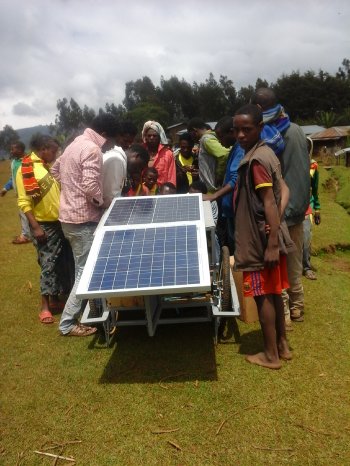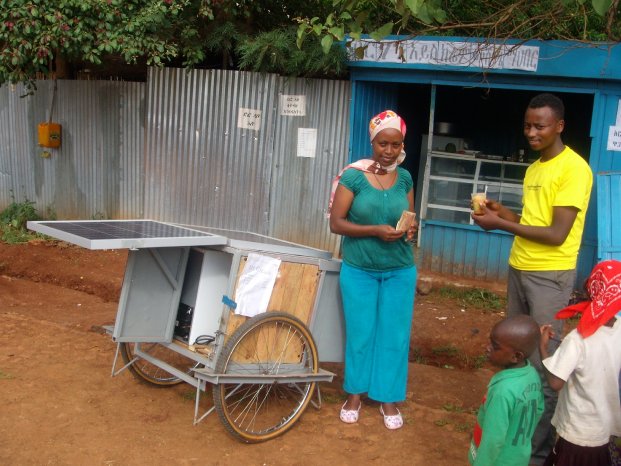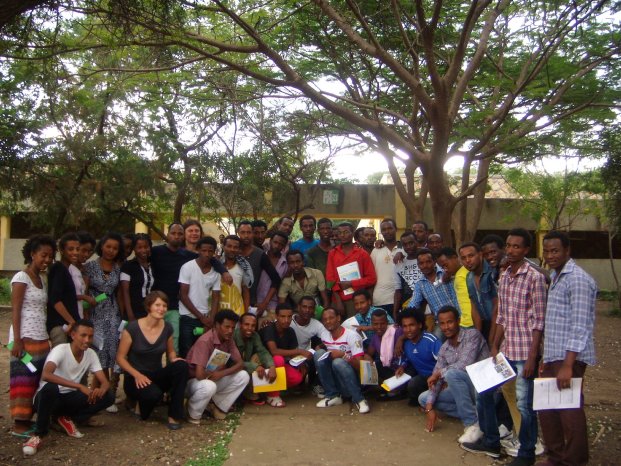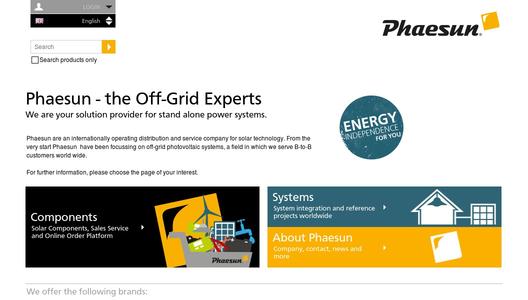Students of the University of Arba Minch have collected ideas for these systems during a field trip to the remote mountain village of Laka which has no power supply. Subsequently they sized and constructed the systems directed by the German and Ethiopian university lecturers. At the same time, they identified local solar entrepreneurs in cooperation with the local government of Laka and developed business plans.
Unique cooperation in an international team
Engidaw Abdel Haile, leader of the solar competence centre at the University of Arba Minch reports: "It is a unique cooperation between international experts, Ethiopian university students and small local enterprises who developed systems perfectly tailored for the users' requirements. So the mobile solar hair salon e.g. offers its services mainly on market days. The students therefore assembled the solar system and the hairdresser's equipment on a robust carriage, so the hairdresser is able to push his equipment on a carriage to the market in Laka and the surrounding villages without problems."
The solar enterprise Phaesun, supports this project as an industrial partner with solar components and training courses on the sizing and marketing of solar systems. One reason to participate in this project is the development of BOSS solutions together with the different stakeholders and test them in practice. BOSS in this case, stands for Business Opportunities with Solar Systems and is the name for solar systems that are used for income generation.
Tobias Zwirner, Managing Director of Phaesun knows that the existing solar kits are prototypes with room for improvement, however, this is a perfect training ground for all participating parties, as he puts it. "The local entrepreneurs remain in contact with the university for 2 years which corresponds with the amortisation period for the investments made for the solar systems, but also with the term they are supported in case of occurring problems.
So, e.g. the wheels of the carriages had to be changed already since they were not robust enough to carry the weight of the solar batteries. Moreover, the operators in Laka were surprised about problems occurring with the solar system during a long period of rain. So the students realise how important it is to use high quality components and to raise awareness about the chances and limitations of solar energy."
The project already started in December 2013 with an introduction workshop of the participating responsible parties of all partner organisations in Ulm and a first trip to Ethiopia of the German university team to prepare the project.
This was followed by an intensive 8-weeks training phase in Neu-Ulm for eight Ethiopian lecturers. The focus was laid on the conveyance of the physical basics of solar energy, technical training courses of system sizing, development of business plans and the marketing of services.
During the summer semester holidays, the Ethiopian students of engineering science, agricultural economics, and business economics could then apply for the interdisciplinary additional study course.
55 students were selected for the first run of the programme. The lectures first took place as intensive block courses in the semester holidays from July 2014 on and later at the weekends during the ongoing semester from October on.
Future plans: Local assembling of solar carriages
In the second part of the course, the students engross what they have started already in the first weeks together with the small local businesses "scaling up" the business models. The challenge now is "entrepreneurial activity on a larger scale". One group of students e.g. is planning a workshop for the manufacture of "solar carriages". The necessary components can be bought from wholesalers in the capital. Based on the knowledge acquired, the students configure various complete systems such as mobile phone charging stations and offer these to entrepreneurs in regions without connection to the grid. Other students are rather aiming at the solar power supply of private households and do the planning with local service teams. In February 2015 the students get the chance to present their business plans to potential investors at a conference at Arba Minch University.
The AEEP Applied Entrepreneurship and Education Programme is a training project supported by the DAAD (German Academic Exchange Service), co-financed with funds from the Federal Ministry of Education and Research (BMBF). It was initiated by the University of Neu-Ulm, the University of Arba Minch, Sahay Solarverein Afrika e.V., the company Phaesun and further industrial partners in 2013. The project will be lasting for three years until the end of 2016. The study course will take place three times during the project run time with the target to anchor the study course in the curriculum of the University Arba Minch and carry it out independently in the future.




